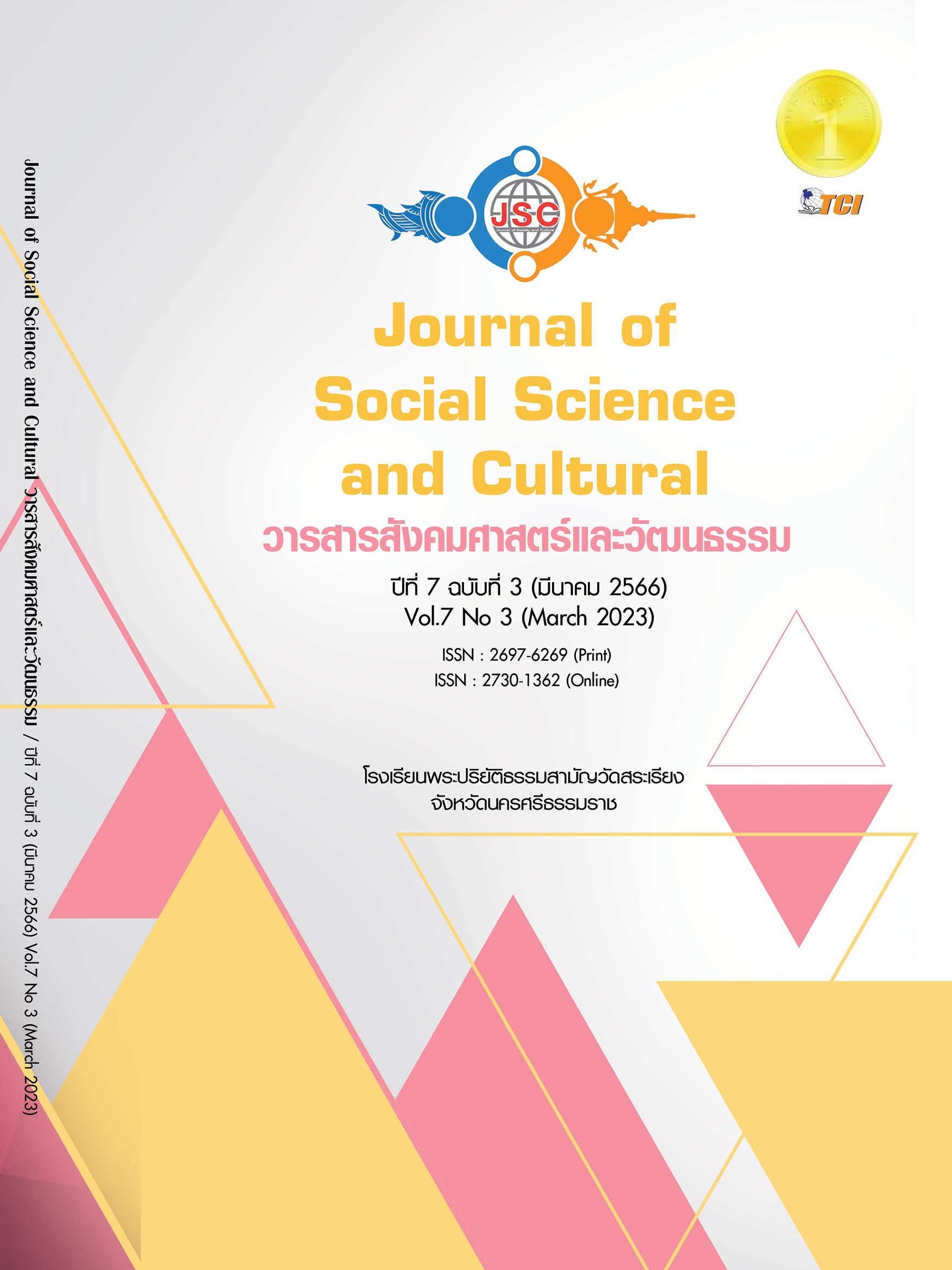GUIDELINES FOR THE INNOVATIVE LEADERSHIP DEVELOPMENT OF SCHOOL ADMINISTRATORS UNDER THE BANGKOK SECONDARY EDUCATION SERVICE AREA OFFICE
Main Article Content
Abstract
The perpose of this research were to 1) study the current and desirable conditions of the guidelines for the innovative leadership development of school administrators under the Bangkok Secondary Education Service Area Office and 2) to propose the guidelines for the innovative leadership development of school administrators under the Bangkok Secondary Education Service Area Office. The mixed methods research were conducted. The sample used in this study consisted of a total of 357 people which were school administrators, deputy school administrators and Teachers responsible for information technology the findings show. The research tool used in the data collection was five-level scale questionnaire with a dual-response format. The Modified Priority Needs Index (PNI modified). and focus group discussion. The results of the research found that 1) Current and desirable innovative leadership conditions as a whole, the average of the current conditions is “very”. When considering the mean desirable condition in each aspect, it was at the “highest” level in all aspects and when arranging the need for PNI Modified as follows : Transformational vision, Teamwork and participation, Motivation, Creativity, Corporate culture, Risk management, Networks and relationships, Information and communication technology, Respectively; 2) Innovative leadership development guidelines of educational institute administrators found that the executive must develop a plan to advance the management structure, creating experiences Benchmark by a study visit to and innovative model schools. Brainstorming for all members to participate in setting goals together, Organize a forum to exchange knowledge professional learning community, Promote the use of innovative leadership development programs, Including the use of technology and innovation to help work efficiently and effective.
Article Details
References
กุลชลี จงเจริญ. (2562). เอกสารประกอบการสอน หน่วยที่ 2 ภาวะผู้นำเพื่อการบริหารสถานศึกษาในศตวรรษที่ 21. นนทบุรี: มหาวิทยาลัยสุโขทัยธรรมาธิราช.
ชวลิต เกิดทิพย์ . (2556). บทเรียนการมีส่วนร่วมเพื่อการจัดการความขัดแย้งระหว่างชุมชนกับโรงเรียนในสามจังหวัดชายแดนภาคใต้. วารสารกึ่งวิชาการรูสะมิแล, 34(4), 75-85.
ฐิตินันท์ นันทะศรี. (2563). การพัฒนาตัวบ่งชี้ภาวะผู้นำเชิงนวัตกรรมของผู้บริหารสถานศึกษา สังกัดสำนักงานเขตพื้นที่การศึกษาประถมศึกษาในภาคตะวันออกเฉียงเหนือ. ใน ดุษฎีนิพนธ์ปรัชญาดุษฎีบัณฑิต สาขาวิชาการบริหารและพัฒนาการศึกษา. มหาวิทยาลัยราชภัฏสกลนคร.
ณิชาภา สุนทรไชย และคณะ. (2561). แนวทางการพัฒนาภาวะผู้นำเชิงนวัตกรรมของผู้บริหารโรงเรียนเอกชนในจังหวัดกาฬสินธุ์. ใน ดุษฎีนิพนธ์ศึกษาศาสตรมหาบัณฑิต สาขาวิชาบริหารการศึกษา. มหาวิทยาลัยขอนแก่น.
นครินทร์ วนกิจไพบูลย์. (2562). จุลินทรีย์แห่งความสำเร็จ. กรุงเทพมหานคร: สำนักพิมพ์อะบุ๊ก.
ประโยชน์ คล้ายลักษณ์ และคณะ. (2556). รูปแบบการพัฒนาสมรรถนะด้านการทำงานเป็นทีมของบุคลากรทางการศึกษา ผู้ปฏิบัติงานในสำนักงานเขตพื้นที่การศึกษาประถมศึกษา. ใน ดุษฎีนิพนธ์ศึกษาศาสตรดุษฎีบัณฑิต สาขาวิชาการศึกษา. มหาวิทยานเรศวร.
ประสิทธิ์ เผยกลิ่น และคณะ. (2560). รูปแบบการบริหารงานด้านความสัมพันธ์กับชุมชนสำหรับสถานศึกษาขั้นพื้นฐาน. ใน ดุษฎีนิพนธ์ครุศาสตรมหาบัณฑิต สาขาวิชาการศึกษา. มหาวิทยาลัยราชภัฏสวนดุสิต .
พยัต วุฒิรงค์. (2555). การจัดการนวัตกรรมจากแนวคิดสู่การปฏิบัติที่เป็นเลิศ. กรุงเทพมหานคร: สำนักพิมพ์จุฬาลงกรณ์มหาวิทยาลัย.
พิทักษ์ ทิพย์วารี. (2558). รูปแบบการพัฒนาภาวะผู้นำทางนวัตกรรมสำหรับผู้บริหารสถาบันพลศึกษา. ใน ดุษฎีนิพนธ์ศึกษาศาสตรดุษฎีบัณฑิต สาขาวิชาการศึกษา. มหาวิทยาลัยสงขลานครินทร์.
พีรดนย์ จัตุรัส. (2561). การประเมินความต้องการจำเป็นในการพัฒนาภาวะผู้นำเชิงนวัตกรรมของผู้บริหารสถานศึกษาขั้นพื้นฐาน สังกัดสำนักงานเขตพื้นที่การศึกษามัธยมศึกษา เขต 39. ใน ดุษฎีนิพนธ์การศึกษามหาบัณฑิต สาขาวิชาบริหารการศึกษา . มหาวิทยาลัยนเรศวร.
สุวิมล ติรกานนท์. (2557). ระเบียบวิธีการวิจัยทางสังคมศาสตร์ : แนวทางสู่การปฏิบัติ (พิมพ์ครั้งที่ 12). กรุงเทพมหานคร: โรงพิมพ์แห่งจุฬาลงกรณ์มหาวิทยาลัย.
อดิศร ก้อนคำ. (2563). กลยุทธ์การบริหารเทคโนโลยีสารสนเทศอย่างมีประสิทธิผลสำหรับโรงเรียนขยายโอกาสทางการศึกษา สังกัดสำนักงานเขตพื้นที่การศึกษาประถมศึกษาในภาคตะวันออกเฉียงเหนือ. ใน ดุษฎีนิพนธ์ปรัชญาดุษฎีบัณฑิต สาขาการบริหารและพัฒนาการศึกษา. มหาวิทยาลัยราชภัฏสกลนคร.
อนุพงษ์ ชุมแวงวาปี. (2560). การพัฒนารูปแบบองค์การแห่งนวัตกรรมของโรงเรียนมัธยมศึกษาสังกัดสำนักงานคณะกรรมการการศึกษาขั้นพื้นฐาน. ใน ดุษฎีนิพนธ์ปรัชญาดุษฎีบัณฑิต สาขาการบริหารการศึกษา . มหาวิทยาลัยบูรพา.
อรอนงค์ โรจน์วัฒนบูลย์. (2553). การพัฒนาตัวแบบภาวะผู้นำเชิงนวัตกรรม. ใน ดุษฎีนิพนธ์ปรัชญาดุษฎีบัณฑิต สาขาการบริหารการศึกษา. สถาบันบัณฑิตพัฒนาบริหารศาสตร์.
Alsharija & Watter. (2012). Innovative Leadership by School Principles : Embedding Information Communication and Technology in Kuwiti Schools. Journal of International Research, 8(4), 425-434.
Guetchius. (2018). Innovative School Leaders Part 1 : How to Become on Innovative School Leade. Retrieved January 24 , 2018, from https://www.edelements.com/blog/innovative-school-leaders-part-1-how-to-become-an-innovative-school-leader
Wooi. (2013). The moderating effect of long3term orientation on the timing and Types of Rewards. Managing Service Quality. An International Journal, 12(2021), 1-9.

